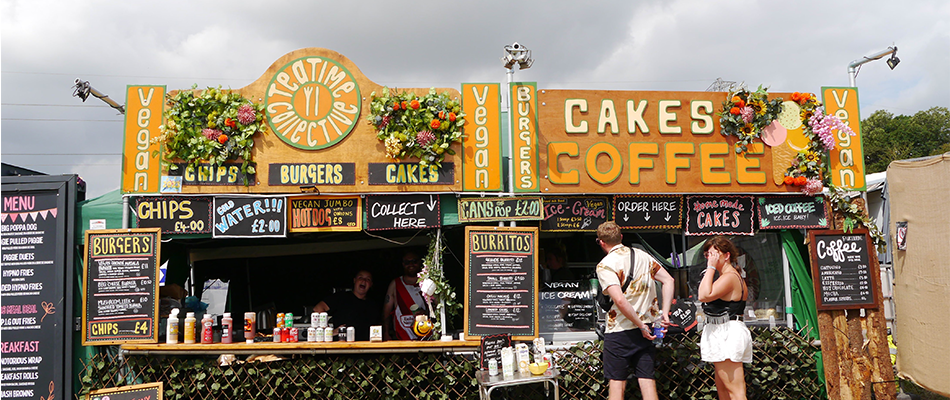
Since it began as a small-scale event on a dairy farm in 1970, Glastonbury has become one of the world’s biggest festivals. In 2023, more than 140,000 ticket-holders enjoyed entertainment at over 100 stages across five days, in the heart of Somerset. Celebrating diversity in culture, Glastonbury has become a place of joy and discovery for attendees, but the Festival has also proven to have a positive influence beyond the arts.
In 2023 we commissioned a report to measure the Festival’s economic impact, in both the immediate local economy and the wider economic environment. The report, carried out by research specialists Fourth Street, found Glastonbury Festival to have a significant positive economic impact both nationally and in Somerset, generating around £168 million of income for UK businesses including £32 million for businesses based in Somerset.
What Glastonbury Festival spends
The total cost of putting on the 2023 Glastonbury Festival was approximately £62 million, paid across 922 organisations providing services to the Festival. Included in this are the materials and infrastructure that bring the fields to life; all the crew creating the build and managing the stages; and costs for the staff that work for the Festival throughout the year.
Of this £62 million spent by the Festival, just under £12 million was paid to 258 companies in Somerset.
What Glastonbury Festival-goers spend
Glastonbury Festival draws its audience from all over the UK and around the world. In 2023, Festival-goers were estimated to have spent £1.6 million in the wider Somerset community: a quarter of this went to businesses providing food and drink, while 50 percent of it was spent in local shops and supermarkets for provisions and supplies for the Festival.
Income generated for others
The Festival also helps generate income for other businesses outside of the Festival site – both in the local area and elsewhere. Around 900 Festival-goers stayed in local hotels and B&Bs during the Festival, spending a total in the region of £450,000. Some Festival-goers also stayed in hotels and B&Bs on the journey to and from the Festival.
Neighbouring landowners were also able to generate income, either from operating accommodation themselves in the form of B&Bs or campsites unaffiliated to the Festival, or renting their land to others to operate from. An estimated 4,000 Festival-goers stayed in privately-run, offsite campsites adjoining the Festival site, spending in the region of £6.5 million.
As well as Festival-goers, crew working for Glastonbury were estimated to have spent about £900,000 with local businesses outside the Festival during their time spent on site. Those volunteering at the Festival, are estimated to have spent a further £500,000 with local businesses.
Jobs created by Glastonbury
The sheer size, breadth and temporary nature of the Festival means it is reliant on an array of professionals to bring it to fruition. The Festival directly and indirectly sustains a broad range of jobs and industries, including IT services and plumbing, signwriting and caravan rentals, security and catering, among many others. In 2023, Glastonbury Festival sustained over 1,100 UK jobs in total, 325 of which were based in Somerset.
Of these, the Festival directly paid for work itself equivalent to around 255 full time jobs. Around 80 people worked for the Festival office in planning and administration (the equivalent of 55 full time jobs), most of whom live locally to the Festival.
In total, an additional 1,750 people worked directly for Glastonbury Festival in 2023, over shorter periods of time. These roles made up the equivalent of 200 full time jobs. Those who are self-employed estimated that on average, Glastonbury Festival accounted for 16% of their annual earnings. However, some obtain a much larger part of their annual earnings from the Festival.
Jobs created by Glastonbury for others / traders
Glastonbury Festival is more than just an arts festival; it is a food festival; a vibrant market – selling everything from bucket hats to handcrafted jewellery; and a craft and wellbeing centre, offering everything from massages to stone masonry workshops. The Festival provides many opportunities for external traders and in 2023 it featured 918 trading stalls, including 56 units which provided food and drink to crew. With a handful of exceptions, all stalls were operated by independent businesses, and staffed by 9,500 people working for around 314,000 hours – the equivalent to 170 full time jobs.
Contribution of volunteers
An incredible bank of volunteers donate their time while providing essential services to Glastonbury Festival: from stewarding and loo clean-up teams, to property lock-ups and campsite crew. These volunteers raised much needed funds for organisations including Friends of the Earth, Samaritans, Diverse UK, Dorset and Somerset Air Ambulance Charity, Cancer Research UK as well as many local schools, community organisations, hospices, carnival clubs, sports clubs and other groups.
In 2023, there were more than 10,000 volunteers at Glastonbury Festival – giving around 240,000 hours of their time for over 200 not-for-profit groups. Of these, 3,511 stewards raised £700,000 in total for their chosen organisations. Oxfam and Water Aid provided 2,500 and 700 volunteers on similar terms.
Over 30 percent of those volunteering at Glastonbury Festival raised funds for organisations within the area.
Charitable Donations / social responsibility
In 2023, Glastonbury Festival was thrilled to have made payments of over £3.7m to a range of incredible charitable causes and campaigns. It is thanks to those who support the Festival that we have been able to make these donations to help those facing challenges both in the UK and across the world. In addition to this £3.7m, the Festival’s raffle of Glastonbury tickets for Oxfam’s Crowdfunder DEC Appeal raised over £1m towards the Syria-Turkey Earthquake response, while an online auction of tickets raised £116,000 for the Trussell Trust.
The Festival has also contributed to its host village of Pilton by building 52 social housing homes and upgrading the village playing fields to include a new pavilion, club house, skate park and tennis courts. The Festival also helped fund the rebuilding of the Pilton Club and Village hall, as well as the restoration of the historic Tithe Barn.
Methodology of the report
The report was based on a survey of 643 Festival-goers – interviewed face-to-face at the 2023 Festival – plus an online survey of 354 Festival staff and 148 volunteers, as well as 30 telephone interviews with local businesses.
